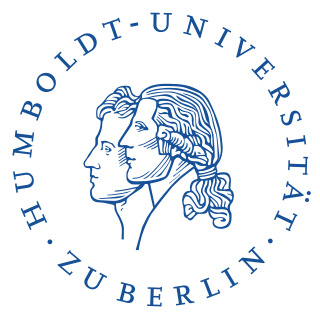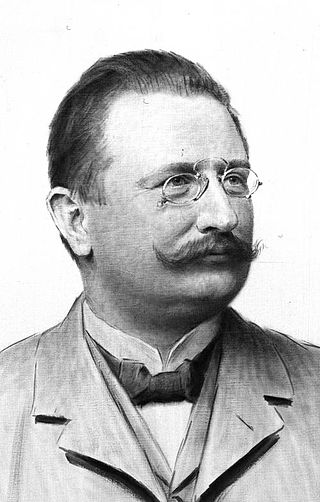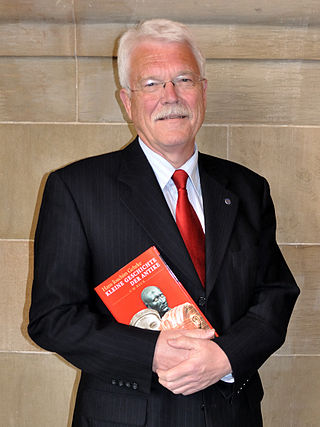
Christian Gottfried Ehrenberg was a German naturalist, zoologist, botanist, comparative anatomist, geologist, and microscopist. He is considered to be one of the most famous and productive scientists of his time.

The Humboldt University of Berlin is a public research university in the central borough of Mitte in Berlin, Germany.

Otto Ferdinand Georg Kern was a German classical philologist, archaeologist and epigraphist. He specialized in the field of ancient Greek religion, being known for his investigations of Greek mystery cults and Orphism, as well as the ancient city of Magnesia on the Maeander and later also the history of ancient studies. In 1907 he became professor at the University of Halle-Wittenberg, where he became rector in 1915/16.

The Gottfried Wilhelm Leibniz Prize, or Leibniz Prize, is awarded by the German Research Foundation to "exceptional scientists and academics for their outstanding achievements in the field of research". Since 1986, up to ten prizes have been awarded annually to individuals or research groups working at a research institution in Germany or at a German research institution abroad. It is considered the most important research award in Germany.

The German Archaeological Institute is a research institute in the field of archaeology. The DAI is a "federal agency" under the Federal Foreign Office of Germany.
Dieter Vieweger, a Biblical scholar and Prehistoric Archaeologist, was born in Chemnitz, East Germany in 1958. He studied Theology and Prehistoric Archaeology in Leipzig and Frankfurt am Main. After that he held a number of distinguished research and educational positions. Today he teaches at the „Kirchliche Hochschule Wuppertal“, and the universities of Münster and Witten-Herdecke while also being the director of scientific institutes in Jerusalem and Amman as well as in Wuppertal.
The Berlin Sculpture-Network is a cooperative project between the Antiquities Collection of the Berlin State Museums and the Institute of Classical Archaeology at the Free University of Berlin. It is funded by the German Federal Ministry of Education and Research within the initiative “Translating Humanities”. This project aims to reconstruct the spatial, functional and substantive contexts context of ancient sculptures.

Hans-Joachim Gehrke, in full Hans-Joachim Günter Adolf Gehrke, is a German historian of ancient and classical antiquity. He was president of the German Archaeological Institute from 2008 to 2011.
Wolfram Hoepfner is a German classicist, archaeologist, architectural historian, and Professor of Ancient Architectural History, at the Free University of Berlin.
Stefan Lehmann is a German classical archaeologist.

Jutta Frieda Luise Meischner is a German archeologist with specialities in philology, classical archaeology, ancient history with a doctorate on Classical Archaeology. In 1964, she started working for the German Archaeological Institute, Berlin.

Paul Diepgen was a German gynecologist and historian of medicine. He was born in Aachen.
Tilmann Buddensieg was a German art historian.

Raiko Krauss, born 1973 in Friedrichshain, Berlin is a German archaeologist of prehistory.
Marietta Horster is Professor of Ancient history at the University of Mainz. She specialises in the study of epigraphy in the Roman Empire.
Jürgen Oldenstein is a German provincial Roman archaeologist.

Monjukli Depe is an ancient settlement in south Turkmenistan, at the northern edge of the Kopet Dag mountains. Excavations reveal occupation from the late Neolithic period, starting about 6200 BC, to the early Chalcolithic period. The earliest layers belong to the Jeitun culture of Turkmenistan.
Kathinka Rebling was a German violinist and musicologist.

Katja Lembke is a German classical archaeologist and Egyptologist and director of the Lower Saxony State Museum in Hanover.
Anja Hellmuth Kramberger, born Hellmuth is a German archaeologist, author and researcher.











